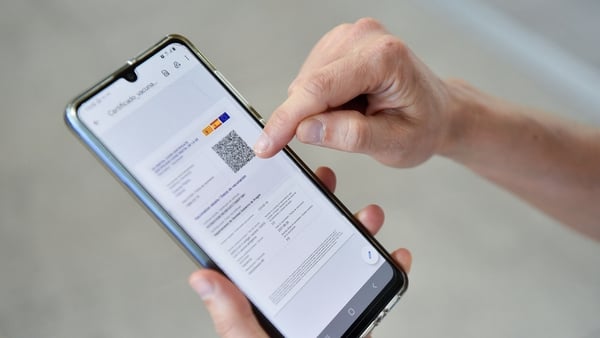People in the 30 to 34 age group can register for an mRNA vaccine from tomorrow on the HSE vaccination portal, the Minister of Health has confirmed.
Those in the 18 to 34 cohort are also allowed to opt-in and receive the single-dose Janssen vaccine with their local pharmacy - commencing yesterday.
In a post on Twitter, Stephen Donnelly said of the 30 to 34 cohort: "Appointments will follow in a matter of days with the first vaccinations for this group next week".
Those aged 34 can register for an mRNA (Pfizer or Moderna) jab from tomorrow, with 33-year-olds on Thursday, finishing with those aged 30 being allowed to register on Sunday.
The estimate for the number of unvaccinated people in the 18 to 34 age group is about 800,000.
Over half the adult population in Ireland is now fully vaccinated against Covid-19, Health Service Executive CEO Paul Reid has confirmed.
Meanwhile, 69% of adults have received one dose of a Covid vaccine.
Mr Reid wrote on Twitter that a total of 4.42 million vaccines have been administered to date with 345,000 completed last week.
"We are working hard to protect as many people as quickly as possible," he added.
The HSE has said there are now around 126,000 people waiting on their second dose of AstraZeneca vaccine.
It said this group is due to be completed by the end of next week.
Minister Donnelly hailed half the adult population being vaccinated as a "big, big milestone".
Speaking on his way into Cabinet this morning, Mr Donnelly said the recent rise in Covid-19 cases is "in line with what was predicted" by the National Public Health Emergency Team's modelling.
Minister Stephen Donnelly says that the recent rise in Covid-19 cases is "in line with what was predicted" by NPHET's modelling. He also said the country has reached a "big, big milestone" now that half of the adult population has been fully vaccinated | https://t.co/qYTamO8wwC pic.twitter.com/uuao2E2U29
— RTÉ News (@rtenews) July 6, 2021
He said there have been spikes in cases across the UK, a range of European countries, as well as in Israel.
Mr Donnelly is giving Cabinet an update on where the country is regarding the Delta variant of Covid-19.
He said 285,000 doses of the Janssen (Johnson & Johnson) vaccine are due to arrive this month and that "between June and July", Ireland will have close to 500,000 of the one-shot vaccines being delivered.
He wants to see these being sent out to pharmacies for use.
Mr Donnelly said the Chief Medical Officer's view is that Ireland can open up safely for people who are fully vaccinated and that is the "safe and sustainable" thing to do.
The Department of Health yesterday reported 365 more Covid-19 cases, with 70% of all cases now linked to the Delta variant.
There are 51 people with the virus in hospital, 14 of whom are in ICU.
There were some further easing of coronavirus restrictions yesterday, including no limit on the number of people who can meet up indoors, if they are fully vaccinated or have had Covid-19 in the previous nine months.
Hospitality representatives were told that indoor dining could reopen for 1.8 million fully vaccinated people with a self-regulated vaccine pass system.
A letter will shortly be issued to fully vaccinated people ahead of the return of non-essential travel from 19 July, so they can avail of the EU Digital Covid Certificate.
Minister for Transport Eamon Ryan said that some of the health data emerging about the Delta variant of Covid-19, particularly from the UK, will be significant in terms of hospitalisations.
Speaking on his way into Cabinet this morning, Mr Ryan said the data will "give us a clear signal on how we do things (here)".
He said he expects plans to resume international travel from 19 July are "on track".
GPs cannot give alternative vaccines to those waiting for second AZ shot
Meanwhile, a Clare-based GP has said GPs do not have permission from the HSE or the National Immunisation Advisory Committee to use a Pfizer or Moderna vaccine as an alternative shot for those waiting on their second AstraZeneca vaccine.
Speaking on RTÉ's Today with Claire Byrne, Dr Yvonne Williams said there is still a percentage of people who are high risk and are awaiting their AZ second dose, but doctors have been told that this category will all be done within the next week.
A professor of immunology at Dublin City University said that NIAC needs to give the go-ahead so that a plan can be put in place to vaccinate children aged 12 to 17 for Covid-19 ahead of the next school term.
Professor Christine Loscher said there is a concern about the impact of long-Covid disease among this age group.
Speaking on the same programme, Prof Loscher said that both the Moderna and Pfizer vaccines have been approved for use in Europe, the US and the UK with very positive safety data.
She said that "no huge issues with safety" came to the fore with the mass worldwide rollout of Pfizer and Moderna vaccines.

